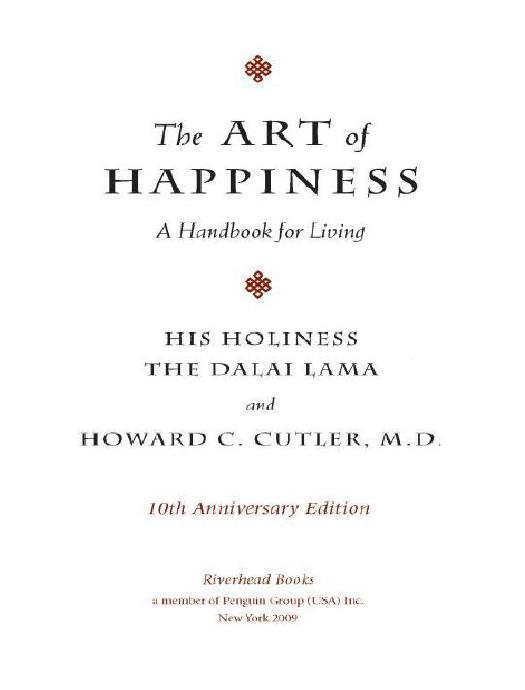The Art of Happiness by The Dalai Lama

Author:The Dalai Lama
Language: eng
Format: epub, pdf
Publisher: Penguin USA, Inc.
Published: 2010-03-01T05:00:00+00:00
We also often add to our pain and suffering by being overly sensitive, overreacting to minor things, and sometimes taking things too personally ...“ With these words, the Dalai Lama recognizes the origin of many of the day-to-day aggravations that can add up to be a major source of suffering. Therapists sometimes call this process personalizing our pain—the tendency to narrow our psychological field of vision by interpreting or misinterpreting everything that occurs in terms of its impact on us.
One night I had dinner with a colleague at a restaurant. The service at the restaurant turned out to be very slow, and from the time we sat down, my colleague began to complain: “Look at that! That waiter is so damn slow! Where is he? I think he’s purposely ignoring us!”
Although neither of us had pressing engagements, my colleague’s complaints about the slow service continued to escalate throughout the meal and expanded into a litany of complaints about the food, tableware, and anything else that was not to his liking. At the end of the meal, the waiter presented us with two free desserts, explaining, “I apologize for the slow service this evening,” he said sincerely, “but we’re a little understaffed. One of the cooks had a death in the family and is off tonight, and one of the servers called in sick at the last minute. I hope it didn’t inconvenience you ...”
“I’m still never coming here again,” my colleague muttered bitterly under his breath as the waiter walked off.
This is only a minor illustration of how we contribute to our own suffering by personalizing every annoying situation, as if it were being intentionally perpetrated on us. In this case, the net result was only a ruined meal, an hour of aggravation. But when this kind of thinking becomes a pervasive pattern of relating to the world and extends to every comment made by our family or friends, or even events in society at large, it can become a significant source of our misery.
In describing the wider implications of this kind of narrow thinking, Jacques Lusseyran once made an insightful observation. Lusseyran, blind from the age of eight, was a founder of a resistance group in World War II. Eventually, he was captured by the Germans and imprisoned in Buchenwald concentration camp. In later recounting his experiences in the camps, Lusseyran stated, “ ... Unhappiness, I saw then, comes to each of us because we think ourselves at the center of the world, because we have the miserable conviction that we alone suffer to the point of unbearable intensity. Unhappiness is always to feel oneself imprisoned in one’s own skin, in one’s own brain.”
Download
This site does not store any files on its server. We only index and link to content provided by other sites. Please contact the content providers to delete copyright contents if any and email us, we'll remove relevant links or contents immediately.
The Four Agreements by Don Miguel Ruiz(5511)
Flow by Mihaly Csikszentmihalyi(4052)
The Four Tendencies by Gretchen Rubin(4024)
You Do You by Sarah Knight(4024)
Adulting by Kelly Williams Brown(3670)
The Hacking of the American Mind by Robert H. Lustig(3580)
A Simplified Life by Emily Ley(3571)
Right Here, Right Now by Georgia Beers(3497)
The Power of Positive Thinking by Norman Vincent Peale(3449)
The Art of Happiness by The Dalai Lama(3383)
Ikigai by Héctor García & Francesc Miralles(3141)
The Little Book of Hygge by Meik Wiking(3080)
The French Women Don't Get Fat Cookbook by Mireille Guiliano(2983)
The Heroin Diaries by Nikki Sixx(2931)
The Choice by Edith Eva Eger(2895)
Why Buddhism is True by Robert Wright(2826)
The Courage to Be Disliked by Ichiro Kishimi & Fumitake Koga(2796)
Make Your Bed by William H. Mcraven(2677)
Spark Joy by Marie Kondo(2676)
